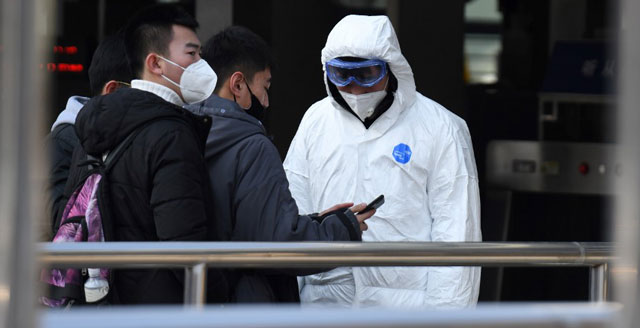
Beijing, China | AFP | The death of a whistleblowing doctor whose early warnings about China’s new coronavirus outbreak were suppressed by the police has unleashed a wave of anger at the government’s handling of the crisis — and bold demands for more freedom.
Ophthalmologist Li Wenliang was among a group of people who sounded the alarm about the virus in late December, only to be reprimanded and censored by the authorities in central Hubei province.
After Li’s death was confirmed early Friday, the 34-year-old was lionised as a hero on social media, while officials were vilified for letting the epidemic spiral into a national health crisis instead of listening to the doctor.
But many also used the occasion to demand more liberties in the Communist Party-ruled country, with the hashtags “I want freedom of speech” and “we demand freedom of speech” appearing on Twitter-like Weibo before being censored.
“Chinese people are only allowed one kind of freedom, and that is the freedom given by the country and the Communist Party,” commented one Weibo user.
“But clearly it is us who should be the masters of this country’s laws.”
Local authorities in Hubei and its capital Wuhan, the city at the epicentre of the crisis, had already faced rare, uncensored criticism online in recent weeks for initially downplaying the magnitude of the outbreak.
While the World Health Organization and some experts have heaped praise on China, saying it took decisive steps to try to contain the virus, critics say precious time was lost by the early inaction of the local government.
Hubei and Wuhan officials held key political meetings in the first weeks of January. The death toll and number of cases only began to soar afterwards, going from one fatality on January 11 to more than 630 barely four weeks later.
Li, who was diagnosed with the virus on February 1, said in a Weibo post in late January that local police had forced him to sign a statement agreeing not to commit any more “law-breaking actions”.
He said police had summoned him after he had seen test results from some patients suggesting SARS in December, and decided to remind his colleagues in a group chat to take stronger precaution measures.
After the Wuhan Central Hospital confirmed on Weibo early Friday that Li had joined the growing number of victims, mourners left hundreds of thousands of eulogies.
“Everything in the world can be suppressed except grief,” a blogger said on the Chinese website Baidu.
– ‘Strong emotions’ –
The public sadness appears to have caught the Chinese government’s usually tightly-controlled propaganda apparatus on the back foot.
State broadcaster CCTV and the Global Times tabloid had reported his death on Weibo late Thursday but they deleted their reports soon after the news became the top search item on the platform with 12 million hits.
The hospital later issued a statement saying Li was undergoing emergency treatment before confirming his death early Friday.
Dali Yang, a political science professor at the University of Chicago, said authorities likely ordered the delay to show there was an effort to save the doctor “because there was such an outpouring of emotion and they wanted to give a sense of hope”.
“Clearly, there was a effort nationally to channel these very strong emotions from across the country,” Yang told AFP.
But the government also did not want to “let it get out of hand” and instead move the grief in the direction that the leadership wants it to go, he said.
The party wants to show that only under its leadership can the country overcome the crisis, he said.
President Xi Jinping has called the fight against the virus a “people’s war”, while China’s ambassador to the United States, Cui Tiankai, on Friday described Li’s work as part of “our joint efforts fighting against” the virus.
In recent weeks, censors had allowed Weibo users to criticise Hubei officials — a move that placed attention on them instead of the central government.
China’s anti-graft agency said Friday it was sending investigators to Wuhan to look into “issues” related to Li.
After Li’s death, criticism went far beyond the anger directed at local officials, with users questioning the nature of the Communist state itself.
– ‘Don’t worry’ –
Some Weibo users used historical references, pointing to Wuhan as the birthplace of the 1911 revolution that ended thousands of years of imperial rule in China.
“The Qing dynasty has been dead for 100 years, how can there still be such bloody tragedies?” wrote one user.
By Friday morning, multiple hashtags related to freedom of speech and Li’s death had been scrubbed from Weibo’s search results.
“If they delete it, post it again. I oppose the criminalisation of speech,” wrote a Weibo user in a post that had been reshared thousands of times.
In one of his final Weibo posts, Li wrote from the intensive care unit that he was having trouble moving and breathing.
“Seeing all the support and encouragement from my online friends, my mood has become more relaxed,” Li said.
 The Independent Uganda: You get the Truth we Pay the Price
The Independent Uganda: You get the Truth we Pay the Price





